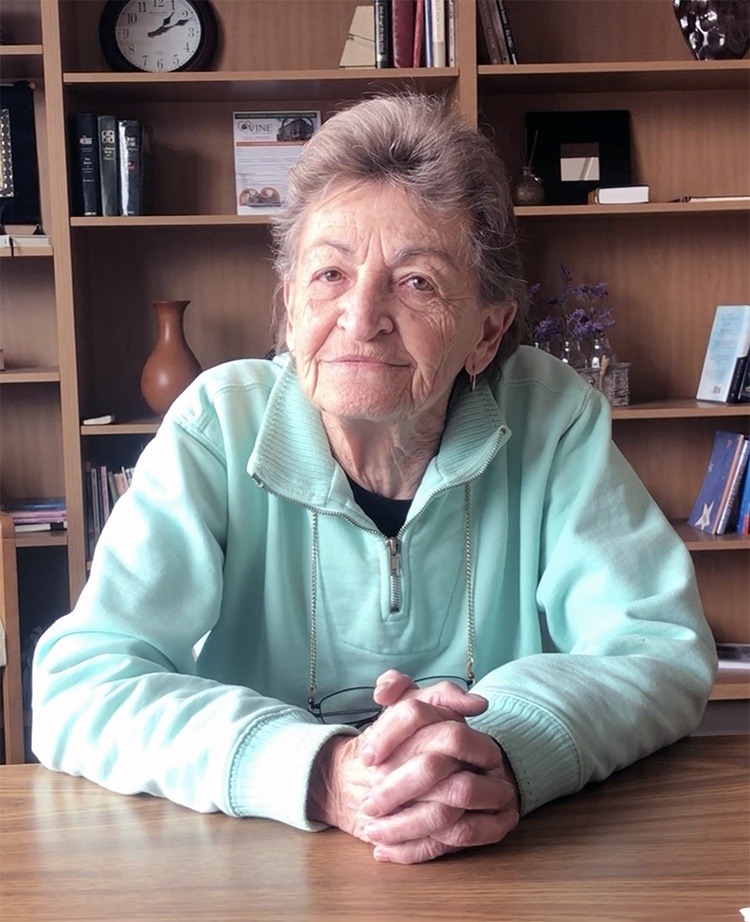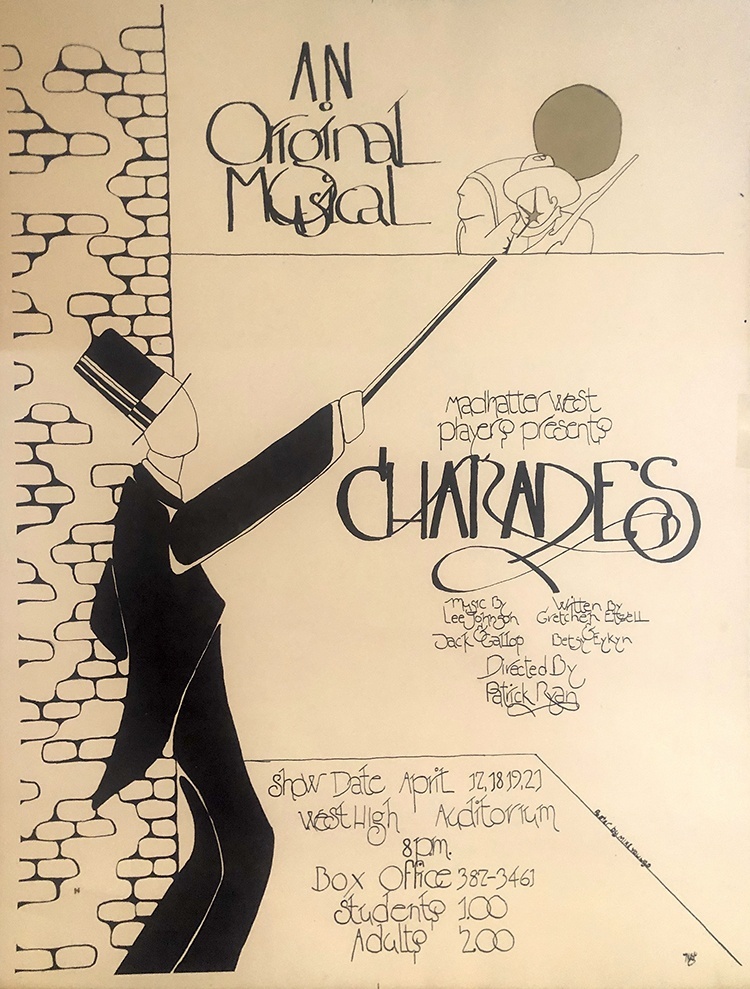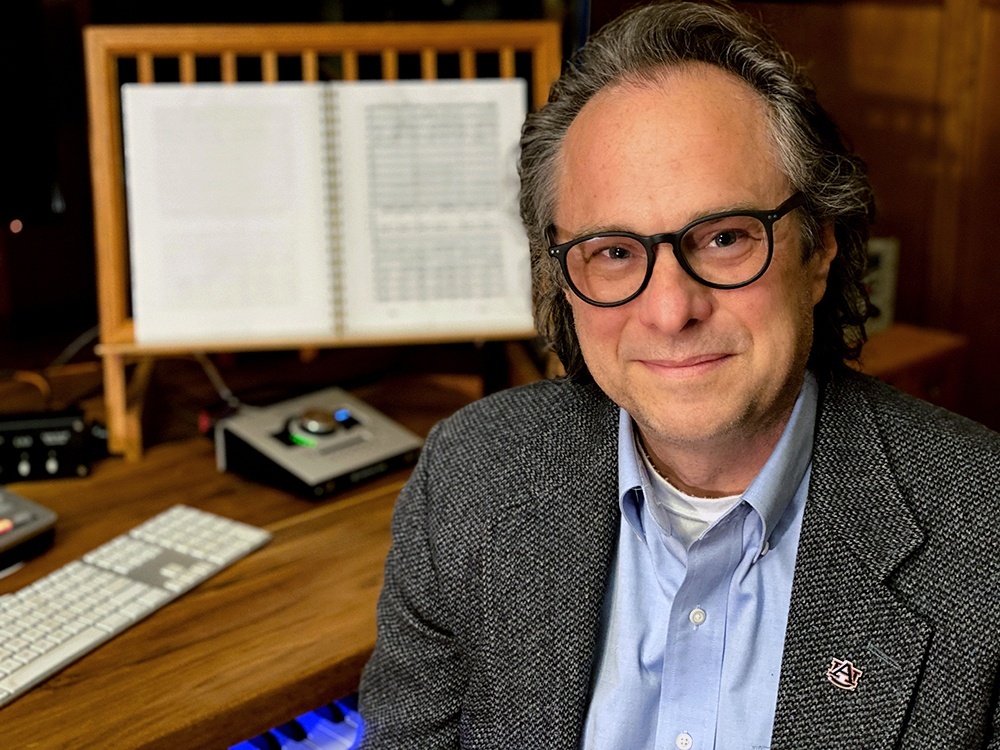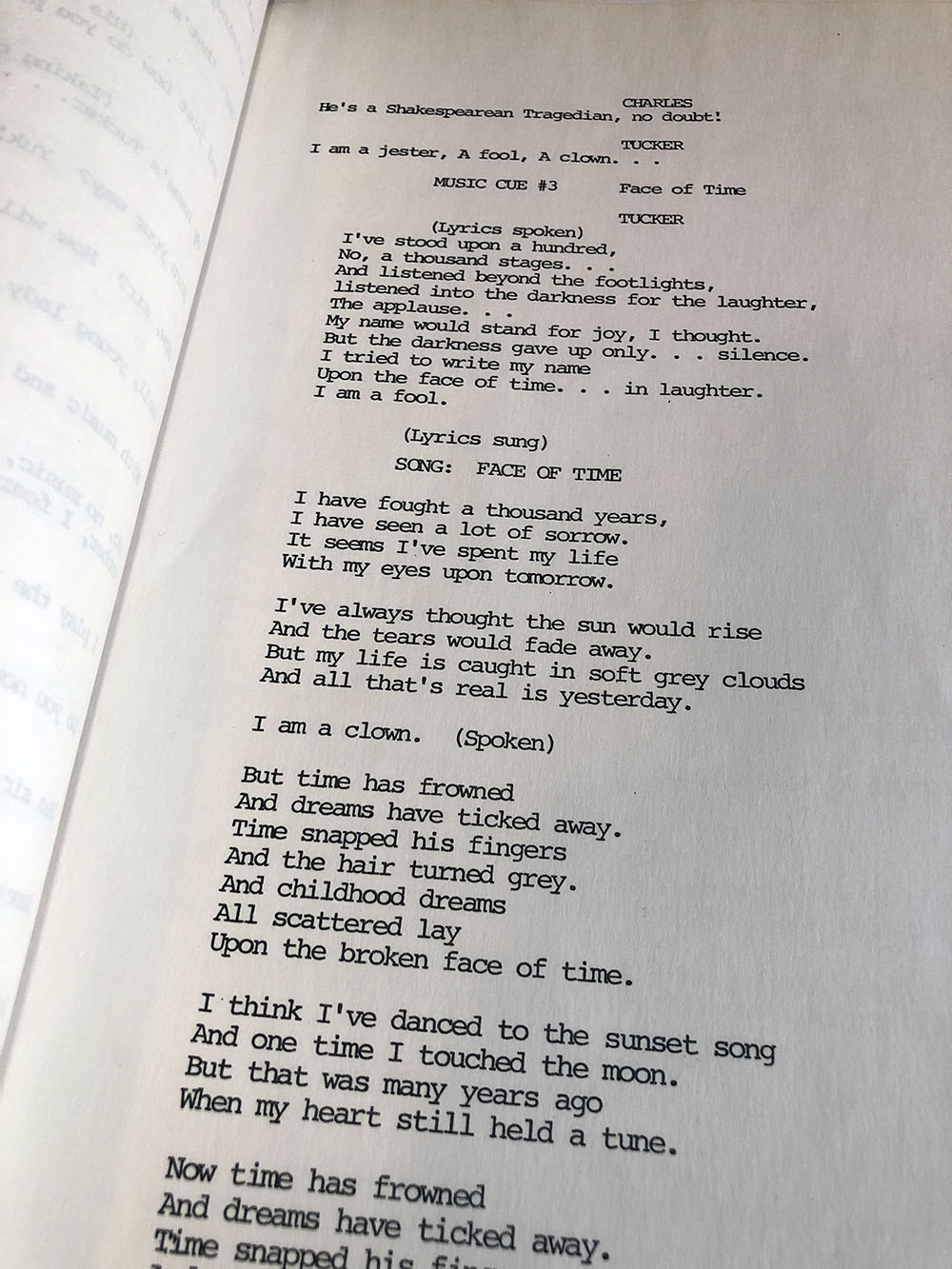
We were “a company of normal American kids,” brought together on a creative adventure that would stay with us for a lifetime.
The partial quote comes from a song that appeared early in the production of Charades, an original musical presented at Mankato West High School in April 1980. I was a senior that year, cast in the role of Frank, one of the young toughs taken on a trip west from New York City by Tucker Sweet, who was described in the playwrights’ notes as “a clown…a broken down, embittered mime artist.”
It was a play that brought together an innovative director teaching at North Mankato Junior High School (Pat Ryan); two English teachers on sabbatical from Mankato West High School (Gretchen Etzell and Betsy Eykyn); two high school student composers (Lee Johnson and Jack Gallup) and dozens of high school students. It resulted in a show that has played for just four performances in its 40-year existence. Its cast recording lay unnoticed on an office shelf for decades afterward, rediscovered by Lee and shared with cast members who are now in their mid-to-late 50s.
Many of the people involved in this production, when contacted all of these years later, had very specific memories of the process. Others could recall fewer details about occurrences. But, to a person, the memories they have are positive.
How it All Got Started
Gretchen and Betsy spent the first part of their year’s sabbatical team-writing a Western novel called Blows An Ill Wind. When Pat asked Gretchen to get involved with the spring musical at West High, she couldn’t say no to the creative challenge. This conversation between the playwrights, as recounted in the Mankato Free Press that April, reportedly took place in January 1980, just three months before the play was to be staged:
Gretchen: “We’re going to write a musical.”
Betsy: “For when?”
Gretchen: “This spring.”
Betsy: “You’ve got to be crazy!”

The Script
To be clear, neither Gretchen nor Betsy had ever written a play before, let alone a musical. The student composers – Lee, a senior at West High, and Jack, a senior at East High – were participants in Quentin Pettigrew’s High-Potential Student Program who had expressed an interest in exploring careers in music. Gretchen had directed plays at West for some years, admitting that directing was more of a “how hard can this be” proposition than something she had studied to do. But through her directing experiences, she figured she knew how writing a play should work.
Gretchen had directed plays at West for some years, admitting that directing was more of a “how hard can this be” proposition than something she had studied to do.
Much of the framework for characters was derived from improvisational exercises Pat had the cast do, using the basis of the story. Gretchen attended rehearsals and captured lines the students created for their characters, often incorporating these lines into the written script. This gave cast members a great feeling of ownership in what they were creating.

“Betsy and I took a week, and we started at 8 o’clock in the morning,” Gretchen recounted recently. “We went to Betsy’s house. I talked and she typed. And every time we would finish a scene, I would take it to Pat. He would copy it and give it to you kids.
“We finished it in a week,” she said, showing her own disbelief with a laugh. “We wrote all of the dialogue, I decided on all the songs, I wrote the lyrics for all the songs. We would give them to Lee and Jack and say, ‘Here’s a song, this is the feel it should have,’ and they would write the music.”
The Music
Lee and Jack had been in a jazz group together, Contemporary Jazz Quartet, so knew they could work well together, recalled Lee, now a Visiting Professor at Auburn University. He is the Fuller E. Callaway Professor of Music chair at LaGrange College in Georgia. During this stay at Auburn, he is creating a program in Composition and Music Technologies similar to the one he created at LaGrange.
Everything else in life was to allow me to find a way to be a composer. … Charades taught me how much I loved that.Lee Johnson
“I can tell you this with confidence – and I would have said it if you’d asked me the day after opening night – I learned from that whole experience that I absolutely wanted to be only a composer,” Lee said recently. “Everything else in life was to allow me to find a way to be a composer. … Charades taught me how much I loved that.”

Jack, now a Senior Scientist in Diagnostics Test Development at Newport Laboratories in Worthington, Minnesota, summed up the experience, “It was our Hair … our collective, hormone-driven, perky adolescent sneeze into the vacuum of ephemeral space-time. … It was absolutely exhilarating and liberating, this creation, in all ways possible.”
It was our Hair… our collective, hormone-driven, perky adolescent sneeze into the vacuum of ephemeral space-time…. It was absolutely exhilarating and liberating, this creation, in all ways possible.Jack Gallup
Lee’s school schedule was adjusted so he had afternoons off from classes. He rode his bike downtown to use a piano. Jack would join him later, often at one of the playwrights’ homes. On the eve of the play’s debut, Lee described the process in a Free Press article:
“We would read the lyrics over and over, until we really understood them,” Lee says. “And you have to give every song a ‘hook’ — a kind of twist at some point during the song that gives it its own character.”
Sometimes the lyrics would give them problems, and they would take time out to look at the score of the musical, Oliver, analyzing the work of professional songwriters.
“Then we’d discuss it with the lyricists, and make some changes,” Lee says. “It was like a self-taught course in poetry analysis.”

The Process
All of this was going on simultaneously with cast rehearsals at West High School. Duane Lahti, who played Tucker Sweet, told me for a March 1980 story in the West Side Story newspaper that the creative process for the cast began on Feb. 18, just two months before the scheduled opening night. He said then, “It’s really going fast,” which was out of necessity, “but it’s going to get faster. But, as Pat Ryan [director] would say, ‘Don’t worry about being behind, everyone is.’”
Today, Duane, who lives south of Evanston, Illinois, has nothing but fond memories of the events: “It definitely was just a wonderful experience, and I think we were very fortunate to have all those things converge at the same time, with Lee and Jack, and Gretchen and Pat and Betsy. All of us together making it happen. … All those things came together and weaved themselves into a magical kind of experience.”
Gretchen said that without the deadline crunch, it’s possible the play would not have happened at all. It pushed the creativity and brought each of the players together in a way that enhanced the collaborative process.
“We were always only one scene ahead of what you guys [cast] were rehearsing,” she said recently. “So, if we decided we made a mistake and should have put [an element] here… Too late, make it work.”
Of course, this created extra challenges when directing the students as well.
“Part of the problem was because we hadn’t written the rest of the show yet,” she laughed, “we couldn’t be real definite as to what the character was going to do. But you kids picked up on it, and I can remember going back to Betsy the next morning and saying, ‘You know what, this is going to work. Because these kids are so paying attention and so into doing this.’ That was so exciting to me.”
The Cast
The cast was big, including students from all four grade levels at West High School. Gretchen said, because it was a musical, she sought and received permission to include all the grade levels. In addition to the 14 principal characters, there were three minor characters and 47 chorus members, for a total of 64 cast members! A four-piece ensemble, including Lee and Jack, provided musical accompaniment.

I had a chance to catch up with a few of them.
Mary Cline Cook
“I was very impressed that it was an original musical, created by people I knew,” recalls Mary Cline Cook, who was a sophomore. “I knew that made it a once-in-a-lifetime opportunity! I felt very fortunate … to have been a part of the whole thing!” She portrayed Alicia Simpson, a schoolteacher who, because of her concern for the kids that Tucker was using for his purposes, ultimately becomes his love interest.
Gregg Peterson
Gregg Peterson, who played Melvin (a.k.a. Spike) said, “Charades was an amazing creative experiment for all of those involved. The music, the script, the character development and the ‘adventure’ were all built upon our collective play and collaboration.
Charades…. brought an amazing amount of joy and fulfillment to an otherwise awkward teenager like myself. A real part of me was captured in Charades and for that I will be eternally grateful.Gregg Peterson
“To think that we each had a hand in bringing to life the character that would eventually live in the script and on the stage brought an amazing amount of joy and fulfillment to an otherwise awkward teenager like myself. A real part of me was captured in Charades and for that I will be eternally grateful.”
Kristine Farnham Eustice
Kristine Farnham Eustice was a senior, but new to West High School. She had moved to Mankato with her family when her dad, Joe Farnham, became a vice president at Minnesota State University.
“The thing that always sticks with me is how much of that was created by an ensemble of high schoolers, as the rehearsals went on,” Kristine stated. “Musical parts, dance steps, and much of the staging was brand new – no prior performances to base it on. My first shot at being that creative.”
She continued, “The folks in the play were very nice to me and I have nothing but fond memories of that process.”
Patti LaGow Kudrle
Patti LaGow Kudrle, who was assistant choreographer as well as a member of chorus, said, “I just remember it being a wonderful experience. Up until that show I had never participated in theater, unless you count the time Gretchen talked Cindy Fitterer [Amoroso] and I into being a dancing elephant in Carnival [two years before Charades]. I was the BACK end!”
Up until that show I had never participated in theater, unless you count the time Gretchen talked Cindy Fitterer and I into being a dancing elephant in Carnival. I was the BACK end!Patti LaGow Kudrle
Remembering the Music
When contacted through a Facebook posting, many people, such as Hollie Forrey Smith, recalled the music. In fact, she hopes many cast members can reunite – when that’s possible – to sing the songs from the show. Lee said that’s something he would be willing to drive to Minnesota to participate in.
One song that most people remember, it seems, is “What Lies Behind Tomorrow.” It’s a song that Frank (me), sang at the end of the show after being mute and used only for my strength through the show up until that point. Frank was hiding from the world in silence, choosing isolation over interaction. The lyrics are even more poignant from a distance of years and in the middle of a worldwide pandemic:
What Lies Behind Tomorrow
What lies behind tomorrow
At the edges of the day?
What frolics on the hillside
And beckons me to play?
What tumbles down the mountainside?
What makes the valley green?
It is the love that we live on
For all the dreams we’ve seen.
I’ve spent my life in alley ways
I’ve cried in silent tears
I could not find the laughter bright
That cowered in my fears.
My head lay down in darkness deep
My body lay in cold
I did not look beyond today
To see new dawns unfold.
The answers that tomorrow held
I did not care to see.
The questions that I dared not ask
Are now all free in me.
For now I know the whippoorwill,
The singing breeze, the lark.
And all my days are brighter still,
The nights not quite so dark.
And I can sing…
“I tell you, I had fun writing lyrics,” Gretchen said. “I know it sounds kind of sappy, but I think the whole point of the story was kind of sappy. And that’s OK.” A recording session was held in West’s orchestra room after the show’s run, coordinated by the show’s technical director, Larry Lloyd.
Lee said, “We wrote [the music] for the character, and we tried to match the song with the person. You know, that’s fun, writing for your friends.”
“I realize we were all extraordinarily lucky,” Lee said, wistfully. “I don’t know how many schools could pull off that feat. Since I don’t remember anything that went bad, it seems like we had a great experience. … It just seemed like a great team effort.”
Tucker Sweet himself will have the last words: “I think there’s still something very unique and special and magical about what brought it together, what gave it its breath, its life,” Duane said. “It couldn’t have been done by one person. It took that whole mix just to make it happen.”



